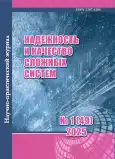TREND ANALYSIS IN THE ARTIFICIAL INTELLIGENCE IMPACT ON GEOPOLITICS AND SECURITY: NEW CHALLENGES AND THREATS OF DIGITAL TRANSFORMATION
- Authors: Masloboev A.V.1,2, Tsygichko V.N.3
-
Affiliations:
- Putilov Institute for Informatics and Mathematical Modeling of the Federal Research Center "Kola Science Center of the Russian Academy of Sciences"
- Institute of North Industrial Ecology Problems of the Federal Research Center "Kola Science Center of the Russian Academy of Sciences"
- Institute for System Analysis of the Federal Research Center «Computer Science and Control» of the Russian Academy of Sciences
- Issue: No 1 (2025)
- Pages: 126-135
- Section: SAFETY IN EMERGENCY SITUATIONS
- URL: https://journals.rcsi.science/2307-4205/article/view/289991
- DOI: https://doi.org/10.21685/2307-4205-2025-1-16
- ID: 289991
Cite item
Full Text
Abstract
Background. The study is aimed at the analysis of state-of-the-art trends in the development of artificial intelligence and the nature of their impact on geopolitical processes, global and regional security. Identification and comprehending the origins of these trends is necessary when engineering effective technological solutions that ensure the achievement of national development goals of the state in the field of protecting its national interests in the cyberspace and maintaining the resilient operation of the related regional critical infrastructures. Materials and methods. A systems analysis of the current problems of digital transformation of the society as a result of the introduction of artificial intelligence technologies in all spheres of public relations was carried out using open literary sources of scientific and technical information, including reports of federal executive authorities and reports of high-tech companies, and is based on a heuristic approach and expert judgements. Results and conclusions. The geopolitical consequences of digital transformation of the economy and management based on the application of artificial intelligence technologies in the socio-economic and military-political spheres are evaluated. Global risks and potential threats to the security and resilience of critical infrastructures that provide essential functions of society and the state when using artificial intelligence and autonomous self-organizing systems are disclosed and specified. The range of promising deployment directions of the AI-based program-technical tools for urgent applications is considered. The analysis outputs allowed us to specify the problem statements and make the rational choice of toolkit for the development of approaches, methods and technologies of explicable artificial intelligence for information support of interpretable decision-making on preventive management of critical infrastructure facilities and critical entities in order to improve their resilience under destructive impacts of artificially initiated nature.
About the authors
Andrey V. Masloboev
Putilov Institute for Informatics and Mathematical Modeling of the Federal Research Center "Kola Science Center of the Russian Academy of Sciences"; Institute of North Industrial Ecology Problems of the Federal Research Center "Kola Science Center of the Russian Academy of Sciences"
Author for correspondence.
Email: masloboev@iimm.ru
Doctor of technical sciences, associate professor, leading researcher of the laboratory of information technologies for industrial-natural system management; chief researcher
(14 Fersmana street, Apatity, Murmansk region, Russia)Vitaliy N. Tsygichko
Institute for System Analysis of the Federal Research Center «Computer Science and Control» of the Russian Academy of Sciences
Email: vtsygichko@inbox.ru
Doctor of technical sciences, professor, chief researcher
(9 60-letiya Oktyabrya avenue, Moscow, Russia)References
- Kontseptsiya vneshney politiki Rossiyskoy Federatsii: ukaz Prezidenta RF № 229 ot 31.03.2023 = The concept of the foreign policy of the Russian Federation : Decree of the President of the Russian Federation No. 229 dated 03/31/2023. (In Russ.). Available at: http://www.kremlin.ru/acts/bank/49090
- O natsional'nykh tselyakh razvitiya Rossiyskoy Federatsii na period do 2030 g. i na perspektivu do 2036 g.: ukaz Prezidenta RF № 309 ot 07.05.2024 = On the national development goals of the Russian Federation for the period up to 2030 and for the future up to 2036: Decree of the President of the Russian Federation No. 309 dated 05/07/2024. (In Russ.). Available at: http://kremlin.ru/events/president/news/73986
- Zelenskaya T.E. Geopoliticheskiy aspekt informatizatsii = The geopolitical aspect of informatization. 2010. (In Russ.). Available at: https://upload.pgu.ru/iblock/701/uch_2010_xiv_00018.pdf
- Tsygichko V.N. The geopolitical consequences of informatization and new security challenges. Informatsionnoe obshchestvo = Information Society. 2002;(1):19–22. (In Russ.)
- Raskin A.V. Informatization and its influence on the nature of the armed struggle. Strategicheskaya stabil'nost' = Strategic stability. 2013;(4):2–5. (In Russ.)
- Zakharova M.V., Smirnov A.I. (eds.). Mezhdunarodnaya bezopasnost' v epokhu iskusstvennogo intellekta: uchebnik dlya vuzov: v 2 t. = International security in the era of artificial intelligence : a textbook for universities : in 2 vol. Moscow: Aspekt Press, 2024;1:401. (In Russ.)
- Strategiya natsional'noy bezopasnosti Rossiyskoy Federatsii: ukaz Prezidenta RF № 400 ot 02.07.2021 = National Security Strategy of the Russian Federation : Decree of the President of the Russian Federation No. 400 dated 07/02/2021. (In Russ.). Available at: http://www.kremlin.ru/acts/bank/47046/page/1
- Tsygichko V.N., Chereshkin D.S., Smolyan G.L. Bezopasnost' kriticheskikh infrastruktur = Safety of critical infrastructures. Moscow: URSS, 2019:200. (In Russ.)
- Chereshkin D.S., Royzenzon G.V., Britkov V.B. Application of artificial intelligence methods for risk analysis in socio-economic systems. Informatsionnoe obshchestvo = Information Society. 2020;(3):14–24. (In Russ.)
- Alekseeva I.Yu. Informatsionnye vyzovy natsional'noy i mezhdunarodnoy bezopasnosti = Information challenges to national and international security. Moscow: PIR-Tsentr, 2001:328. (In Russ.)
- Strategiya nauchno-tekhnologicheskogo razvitiya Rossiyskoy Federatsii: ukaz Prezidenta RF № 145 ot 28.02.2024) = Strategy of scientific and technological development of the Russian Federation : Decree of the President of the Russian Federation No. 145 dated 02/28/2024). Available at: http://static.kremlin.ru/media/ events/files/ru/HHNAzTI1guvX9Y00yaFA4KkMWPyYcWS8.pdf
- Natsional'naya strategiya razvitiya iskusstvennogo intellekta na period do 2030 goda (v red. Ukaza Prezidenta RF № 124 ot 15.02.2024 g.) = National Strategy for the Development of Artificial Intelligence for the period up to 2030 (ed. Decree of the President of the Russian Federation No. 124 dated 02/15/2024). (In Russ.). Available at: http://static.kremlin.ru/media/events/files/ru/AH4x6HgKWANwVtMOfPDhcbRpvd1HCCsv.pdf
Supplementary files





















